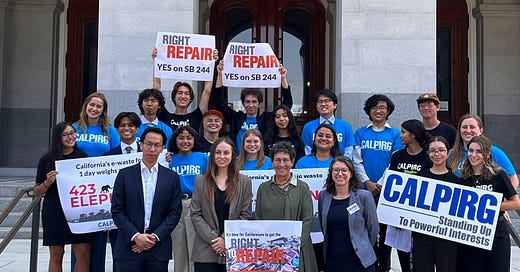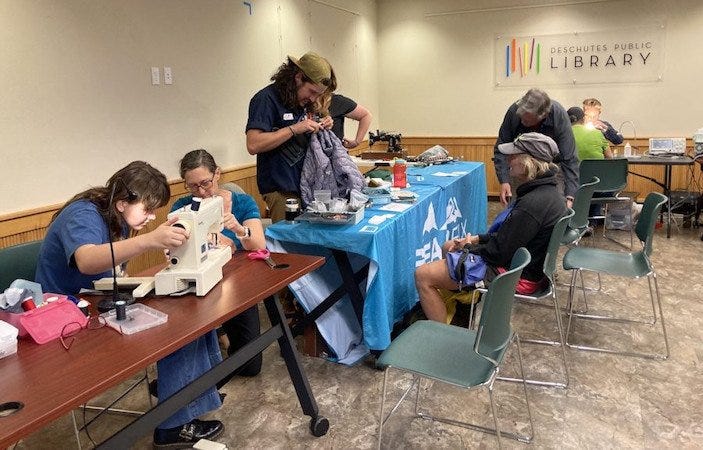Golden: California Becomes Third State To Enact Broad Right To Repair
With Governor Newsom’s signature, California become the 3rd and largest state to enact a broad, electronics right to repair law. Also: iOS 17 patch may fix parts pairing issue.
Big News
On October 10, California Governor Gavin Newsom made his state the third to enact a comprehensive electronics right to repair law. Newsom signed Senate Bill 244, The California Right to Repair Act, into law along with a raft of other legislation as he faced a legally imposed deadline to endorse or reject laws passed by the California state legislature.
While Newsom’s signature was not a surprise, there was some reason for concern. Earlier this month, the Governor vetoed a bipartisan wheelchair right to repair law, modeled on a similar law passed in Colorado, citing the law’s impact on the state’s healthcare system.
“This is a victory for consumers and the planet, and it just makes sense,” said Jenn Engstrom, state director of CALPIRG. “Right now, we mine the planet’s precious minerals, use them to make amazing phones and other electronics, ship these products across the world, and then toss them away after just a few years’ use. What a waste. We should make stuff that lasts and be able to fix our stuff when it breaks, and now thanks to years of advocacy, Californians will finally be able to, with the Right to Repair.”
Nick Lapis, the Director of Advocacy for Californians Against Waste said that the new law will help foster a “thriving market for repair businesses and secondhand sales that will make repair the norm, not the exception.”
Previous efforts to pass a right to repair law in California had died in committee in the face of opposition from Silicon Valley firms and technology industry groups, which raised predictable and unfounded objections about cybersecurity risk and intellectual property rights. In the latest round of negotiations, however, that opposition lessened, with even Apple Computer, a staunch opponent of right to repair laws, signaling support. Last month, the California Assembly voted 65-1 to pass Senate Bill 244, followed by a 39-1 vote in the California Senate, officially sending the bill to the Governor’s desk.
The California Right to Repair Act is the third such bill to be enacted by states in the last year, following New York’s passage of an (unfortunately) narrow electronics right to repair law in December, 2022; and Minnesota’s enactment of a broader bill in May.
California’s passage of the Right to Repair Act, which goes into effect on July 1, 2024, ensures that California residents will have access to repair materials including parts, information and software needed to perform repairs for a wide range of covered products including all electronic and appliance products that cost $50 or more sold in California after July 1, 2021.
It also expands protections for consumers compared to the New York and Minnesota laws. For example, California residents are guaranteed 3 years of parts, tools, and documentation support for products that cost $50-$99.99 and 7 years for products that cost $100 or more.
Still, as with the New York and Minnesota bills, major concessions were needed to get the Right to Repair Act passed. Among them: big carve outs for game consoles, alarm systems, lawn and garden equipment, agricultural and forestry equipment, and a long list of otherwise repairable devices.
And, as Elizabeth Chamberlain of iFixit notes: the bill does not address practices like parts pairing (aka “VIN burning”) that use digital rights management to link specific, replaceable parts to specific devices, severely constraining repair options.
The drum beat of successful state right to repair campaigns appears to be picking up. States like Massachusetts are still weighing similar legislation, while more states are expected to introduce both broad- and focused right to repair bills in upcoming legislative sessions.
Earlier this week, a Utah state legislator said he will introduce an agricultural right to repair bill in that state to help farmers address severe constraints imposed by manufacturers on servicing farm equipment. That follows Colorado’s passage of an agricultural right to repair bill earlier this year, and the introduction on Capitol Hill of federal agricultural right to repair legislation in September.
Other News
Quebec has approved right to repair legislation, known as the “An Act to protect consumers from planned obsolescence and to promote the durability, repairability and maintenance of goods” which amends the Consumer Protection Act to introduce legal warranties for certain new goods, enhance warranties for availability of replacement parts and repair services, prohibit planned obsolescence, grant access to vehicle data, and increase penalties for violations, among other provisions.
iPhone patch fixes overheating - and camera repair obstacle. Apple has released a patch for iOS 17, the latest version of its mobile device operating system, to address overheating issues reported by users of the new iPhone 15. The overheating problem was attributed to a bug in iOS 17 and was promptly addressed with the release of 17.0.3. That may have also fixed another iPhone 15 issue. This one affecting the front-facing camera, which was made unusable after replacing one of its camera modules. According to a report by iFixit, serialization, which pairs iPhone parts, may have caused issues with replacement parts not matching.
Shocker: Tesla and Rivian back bogus auto repair agreement - Electric car makers Tesla and Rivian have signaled their support for a controversial agreement between carmakers and a small subset of automotive repair organizations. The agreement was announced by the Alliance for Automotive Innovation, the Society of Collision Repair Specialists and the Automotive Service Association. The agreement was reached without consulting the Auto Care Association, North America’s largest automotive repair industry group. It also falls short in ensuring access to telematic data, allowing carmakers to control what data is released.
Women tend to experience more eco-anxiety and engage in eco-friendly actions compared to men due to the "eco gender gap," with cultural expectations placing the responsibility for environmental awareness on women. However, this gap may be perpetuated by marketing specifically targeting women with sustainable alternatives, even though gender inequality underlies the issue. Closing the gap requires frank conversations, shared responsibilities, and discerning between genuine sustainability efforts and greenwashing by brands.
Cory Doctorow criticizes the concentration of power and influence among tech giants, saying that they have become inbred and unexceptional due to a lack of competition caused by mergers, acquisitions, and a decline in antitrust enforcement. The universality and interoperability of digital technology once allowed for dynamic competition but has been stifled as governments changed their approach to monopolies and allowed for increased consolidation in the tech industry. This consolidation has led to a lack of diversity in tech and a policy environment that favors large tech companies, enabling them to bypass regulations and control various aspects of the digital landscape.
iFixit used an industrial microscope for an iPhone 15 teardown showcasing details like the Dynamic Island's curves and a 7000x magnified view of the 48MP main camera sensor, while also giving it a repairability score of 4 out of 10 pending Apple's release of repair guides to the public.
Nintendo has announced the shutdown of online services for the 3DS and Wii U in early April 2024. Users can still download, update, and re-download purchased software from the Nintendo eShop, with the specific shutdown date yet to be determined and the possibility of an earlier shutdown if necessary.
The Rethink Waste Project is celebrating its 10th anniversary of hosting Repair Cafés in Central Oregon!






